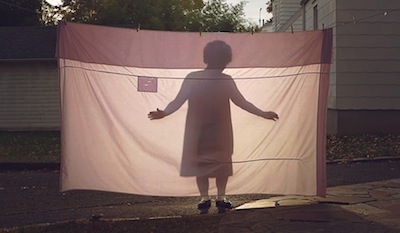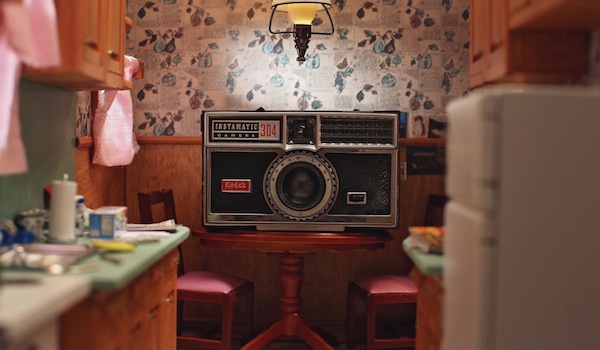Camera in model, from 306 Hollywood. (photo from El Tigre Productions)
Annette Ontell, the New Jersey grandmother at the centre of the glorified home movie 306 Hollywood, lived an ordinary middle-class Jewish existence for six decades at that Newark address.
She didn’t come close to the achievements of RBG heroine Ruth Bader Ginsburg, nor the fame (and heartache) of Love, Gilda star Gilda Radner. Nor did Ontell have the tabloid TV highs and lows of the separated brothers in Three Identical Strangers, yet another documentary with Jewish protagonists that made waves at the box office last year.
Of course, one needn’t get her name in the paper or his face on a screen to live a productive, satisfying life. More to the point, plenty of wonderful and profound documentaries have been made about the small-scale triumphs and travails of everyday people. 306 Hollywood, which received a brief theatrical release in 2018 and airs on PBS’s POV series in the coming weeks, is not one of them.
Siblings Elan and Jonathan Bogarin affect an imaginative and stylized “dig” into their dear grandmother’s objects and possessions to the accompaniment of a kinda whimsical, kinda wistful indie-film score. Their strategy yields a parade of eye-catching images and bizarre set pieces that, individually and collectively, provide no insight into this, or any, American life.
The upshot is that 306 Hollywood combines the lacquered sheen and pastel palette of long-form television with the naiveté-masquerading-as-perceptiveness of a film-school project.

To be sure, the filmmakers’ goals, in addition to crafting a work of commercial art, are worthwhile: to uncover and grasp the meaning in a person’s life, and to honour and preserve the memory of a beloved relative whom they visited (with their mother) almost every Sunday for 30 years.
The Bogarins opt to catalogue and focus on the massive detritus – from radios and vacuum cleaners to rubber bands and fashion magazine clippings – that Ontell amassed over the 63 years she resided in the house, most of it spent with her husband. (Her brother lived with them, but he died in his late 40s.)
Ontell had a career as a dress designer and dressmaker, but the creative person she once was doesn’t emerge in the prosaic interviews that her grandchildren filmed with her over the last decade of her life. Instead, to conjure a person (and a personality) from her inanimate objects, the filmmakers enlist a “fashion conservator.” To invoke the metaphysical resonances of time and memory, they turn to physicist and author Alan Lightman.
Perhaps in a nod to Ontell’s artistic impulses, the Bogarins stage a fashion show with her original evening dresses in the yard at 306 Hollywood, and a ballet of young women modeling mid-20th-century lingerie. These sequences are visually impressive but self-indulgent. They aren’t as misguided, however, as the excruciatingly long home-movie scene of the filmmakers’ mother cajoling Ontell (her mother) into disrobing and donning one of her vintage dresses from the 1950s.
The pained presence of an older woman prodded into revisiting the past through her garments does have one benefit: it frees 306 Hollywood from the bonds of hagiography. But none of this gets us any closer to appreciating Ontell, or any emblematic Jewish mother, or to gleaning significance from the connection that human beings have to their possessions. The filmmakers’ choices are so showily ineffective, in fact, that we only rarely reflect on the emotions triggered by the absence and memories of our own forebears.
The most gifted documentary filmmaker I know at transforming the personal into the universal and the banal into the profound is Alan Berliner. The Jewish New Yorker’s masterful family portraits Intimate Stranger (1991) and Nobody’s Business (1996) can be streamed for free through Kanopy, accessible with many public library cards.
306 Hollywood airs March 30, 11 p.m., on KCTS 9 and on WTVS April 4 (check local listings for the time).
Michael Fox is a writer and film critic living in San Francisco.


